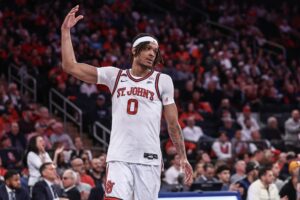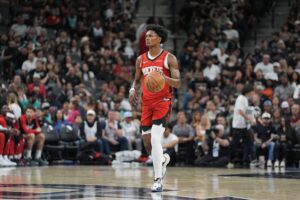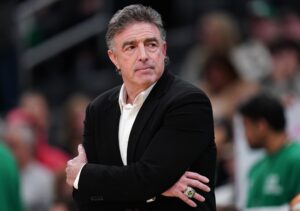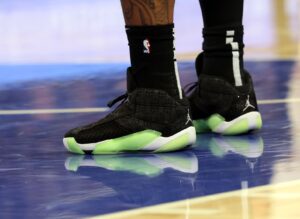A number of NBA players, coaches, and teams have spent the past week denouncing and protesting a Donald Trump presidency. Trump, who won the highly contentious U.S. presidential election on November 8th, has been a polarizing figure in the past year, running a campaign based largely on misogynistic, racist, and xenophobic rhetoric.
The reaction of the NBA to Trump’s rise is not surprising. The league and its players have a strong history of protesting within the new era civil rights movement, particularly in response to incidents of racism and police brutality. Given the influence that professional athletes have in today’s society, this tradition of activism must be supported to continue.
Protest and Basketball: NBA Election Reactions
Players React to Election Result
The reaction of NBA players to Trump’s unexpected win was predominantly unfavorable. This makes sense, given the NBA’s demographics. According to Sports Illustrated’s Jonathan Jones, black players made up 74.3% of the NBA at the start of the 2016-17 season.
Just hours after the election, LeBron James posted a solid black image to his Instagram account, linked to an audio file of rapper Kendrick Lamar’s “Alright”. In an emotionally charged post, James wrote, in part, “Minorities and Women in all please know that this isn’t the end, it’s just a very challenging obstacle that we will overcome!!”
Guards C.J. McCollum and Damian Lillard of the Portland Trail Blazers responded to the election result with prayer:
Lord please help us all 🙏🏽 we're going to need it
— CJ McCollum (@CJMcCollum) November 9, 2016
🙏…
— Damian Lillard (@Dame_Lillard) November 9, 2016
Brooklyn Nets guard Jeremy Lin offered hope in a series of insightful posts:
This election is about wayyy more than race, but it further revealed how big a topic race is and how big of an issue racism still is, sadly.
— Jeremy Lin (@JLin7) November 9, 2016
But long-term, real change requires unification, reconciliation and compassion…one small step at a time. Spread love today!
— Jeremy Lin (@JLin7) November 9, 2016
John 16:33b — In this world you will have trouble. But take heart! I have overcome the world.
— Jeremy Lin (@JLin7) November 9, 2016
New York Knicks big man Joakim Noah reacted with just one word:
How!!!!!
— Joakim Noah (@JoakimNoah) November 9, 2016
Coaches Denounce Trump Presidency
NBA coaches were also quick to note their disappointment in the election result and denounce a Trump presidency. Detroit Pistons head coach Stan Van Gundy made headlines the day after the election, when he chose to use his morning media session with reporters to take aim at the President-elect. Van Gundy called the New York billionaire “brazenly racist and misogynist,” and he criticized the portion of the electorate that voted for the Republican nominee. Golden State Warriors coach Steve Kerr expressed agreement with Van Gundy’s statements and disappointment in the election, comparing it to the Jerry Springer Show. Kerr’s entire statement can be read here, as posted by ESPN writer Ethan Strauss.
Perhaps the most vocal critic on the election result has been San Antonio Spurs coach Gregg Popovich. Popovich, a U.S. Air Force veteran, spent six minutes of his press conference before last Friday’s game against the Pistons harshly condemning Trump, as well as the fact that people voted for him despite the bigoted campaign that he ran.
“I’m just sick to my stomach,” Popovich said. “[T]he disgusting tenure and tone and all of the comments that have been xenophobic, homophobic, racist, misogynistic … I live in that country where half of the people ignored all of that to elect someone. That’s the scariest part of the whole thing to me.”
Popovich’s full statement can be heard here:
https://soundcloud.com/user-761163816/gregg-popovich-uncensored-discusses-donald-trumps-victory?utm_source=soundcloud&
Popovich has continued to express his frustrations with Trump this week, calling the appointment of Steve Bannon as chief strategist “troublesome”. Popovich’s comments on Bannon and Trump’s divisive campaign rhetoric were as follows, according to Tim Bontemps of The Washington Post:
Gregg Popovich was asked about the reaction to what he said last week. It led to another lengthy answer. Here it is. pic.twitter.com/D7sVXvjNgl
— Tim Bontemps (@TimBontemps) November 17, 2016
Teams Boycott Trump Hotels
In addition to speaking out, some teams are taking action to express their displeasure with the election. On November 16, 2016, it was widely reported that the Milwaukee Bucks, Memphis Grizzlies and Dallas Mavericks will no longer stay at Trump-branded hotels. Bucks co-owner Marc Lasry and Mavericks owner Mark Cuban were big Hillary Clinton supporters, with Cuban serving as one of Trump’s most vocal critics during the election cycle.
Shaun King, senior justice writer for the New York Daily News, joined other civil rights activists in calling for other teams to follow suit:
https://twitter.com/ShaunKing/status/798728800393568256
To date, no other teams have confirmed an intent to join in the boycott.
The NBA has Embraced Political Activism
The willingness of the NBA community to denounce the bigoted rhetoric that highlighted the presidential campaign is not surprising. The NBA has been traditionally progressive in its willingness to take a stand on social issues. Notably, in the last 15 years, the league has welcomed the first African-American majority owner of a professional sports franchise (Robert Johnson), the first openly gay player (Jason Collins), and the first female coach (Becky Hammon). Consider these other examples:
In 2014, when former Los Angeles Clippers owner Donald Sterling made racist comments about former Los Angeles Lakers great Magic Johnson, the league forced Sterling to sell the franchise.
This past June, the NBA became the first major sports organization to have a float in New York’s pride parade.
In July, NBA All-Stars LeBron James, Dwyane Wade, Carmelo Anthony, and Chris Paul opened the ESPY Awards with Black Lives Matter speeches.
Also in July, the NBA’s commissioner, Adam Silver, announced that he was moving the 2017 All-Star Game from Charlotte to New Orleans because of House Bill no. 2 (HB2), North Carolina’s anti-LGBT legislation. The relocation of the All-Star Game was a strong anti-discrimination statement by the league; it was the equivalent of an economic boycott.
NBA Players Increasingly Comfortable With Activism
In this progressive environment created by the NBA, individual athletes have become increasingly comfortable in taking their own stances on political issues. In 2010, for example, members of the Phoenix Suns wore jerseys that said “Los Suns” as a political statement in opposition to Arizona’s strict immigration policy and racial profiling.
In 2012, a splattering of players throughout the league, including the aforementioned James and Wade, put on hoodies to call attention to the death of Trayvon Martin and the controversy surrounding it.
Two years later, in 2014, after the death of Eric Garner at the hands of New York Police Department officers, a number of NBA players, including James, Derrick Rose, and Kobe Bryant, wore shirts during pregame warm-ups reading “I Can’t Breathe”. The shirts referenced the final words Garner uttered before he died. The display was the most notable athlete protest in recent memory, not solely because of its widespread nature, but also because marquee players were front and center, refusing to shy away from making a bold political statement.
What to Expect in the 2016 -17 Season
In our sports-obsessed society, professional athletes have a unique opportunity to speak out on social issues and bring attention to the plights faced by many. Social media provides a large and easy platform for these athletes to share their views. Although it’s too late for the NBA to change the outcome of the 2016 presidential election, it’s not too late to employ protests and voice displeasure when civil and human rights are being compromised. The NBA has the ability to influence positive action, both individually and collectively. Given the current political and social climate, fans should fully expect, if not demand, more peaceful protests and publicly shared opinions from players, coaches, and teams this season.
Main Photo:






